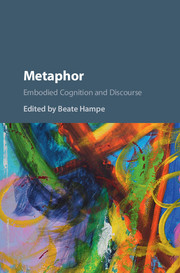Book contents
- MetaphorEmbodied Cognition and Discourse
- Metaphor
- Copyright page
- Contents
- Figures
- Tables
- Contributors
- Editor’s Preface and Acknowledgments
- Introduction
- Part I Metaphor in Cognition
- Part II More than Metaphor
- Part III Metaphor in Discourse
- Part IV Salient Metaphor
- 15 Attention to Metaphor: Where Embodied Cognition and Social Interaction Can Meet, But May Not Often Do So
- 16 Waking Metaphors: Embodied Cognition in Multimodal Discourse
- Epilogue (A Personal View)
- References
- Person Index
- Subject Index
16 - Waking Metaphors: Embodied Cognition in Multimodal Discourse
from Part IV - Salient Metaphor
Published online by Cambridge University Press: 05 July 2017
- MetaphorEmbodied Cognition and Discourse
- Metaphor
- Copyright page
- Contents
- Figures
- Tables
- Contributors
- Editor’s Preface and Acknowledgments
- Introduction
- Part I Metaphor in Cognition
- Part II More than Metaphor
- Part III Metaphor in Discourse
- Part IV Salient Metaphor
- 15 Attention to Metaphor: Where Embodied Cognition and Social Interaction Can Meet, But May Not Often Do So
- 16 Waking Metaphors: Embodied Cognition in Multimodal Discourse
- Epilogue (A Personal View)
- References
- Person Index
- Subject Index
Summary
The consciousness of metaphoric meaning has traditionally been a controversial issue. Often only novel metaphors have been assumed to be vital, whereas conventional metaphors were characterized as dead. This chapter argues that the vitality of metaphoric meaning is a matter of language in use and of speakers’ linguistic repertoires. As long as metaphoric expressions are transparent, metaphoricity can be vitalized and – by being foregrounded – become a focus of shared attention in an interaction. Metaphors may thus dynamically shift between “sleeping” and “waking,” i.e. be more or less experienced and understood as metaphors. The source domain of a “waking” metaphor is active and in the foreground of shared attention. This dynamics of metaphoric meaning is particularly evident in the interplay of speech and gesture. Presenting a microanalysis of multimodal interaction in a dance class, the chapter shows that issues of vitality are aspects of discourse dynamics and embodied meaning-making and that, consequentially, questions debating the consciousness and the processing of metaphoricity are answered by the participants in discourse themselves.
Information
- Type
- Chapter
- Information
- MetaphorEmbodied Cognition and Discourse, pp. 297 - 316Publisher: Cambridge University PressPrint publication year: 2017
Accessibility standard: Unknown
Why this information is here
This section outlines the accessibility features of this content - including support for screen readers, full keyboard navigation and high-contrast display options. This may not be relevant for you.Accessibility Information
- 24
- Cited by
